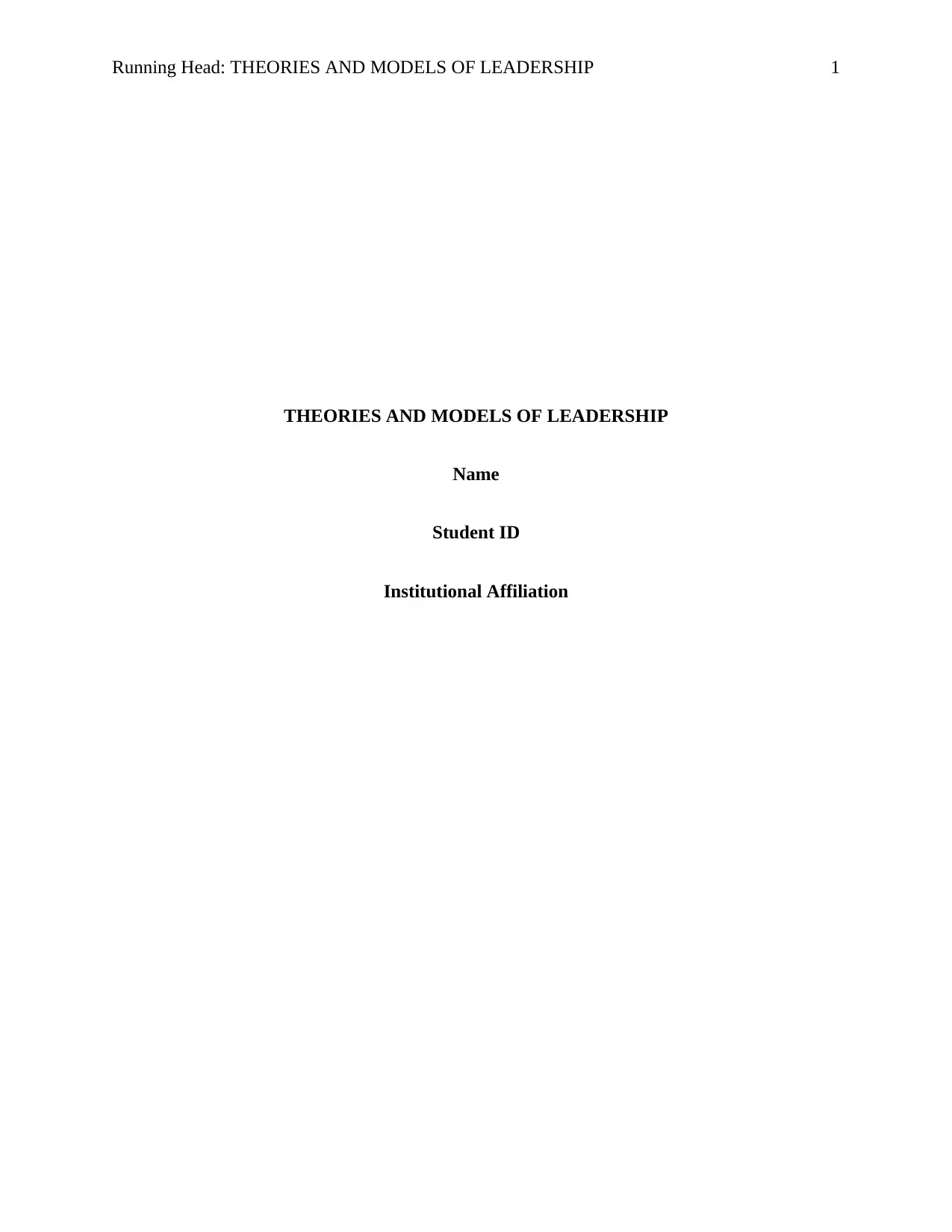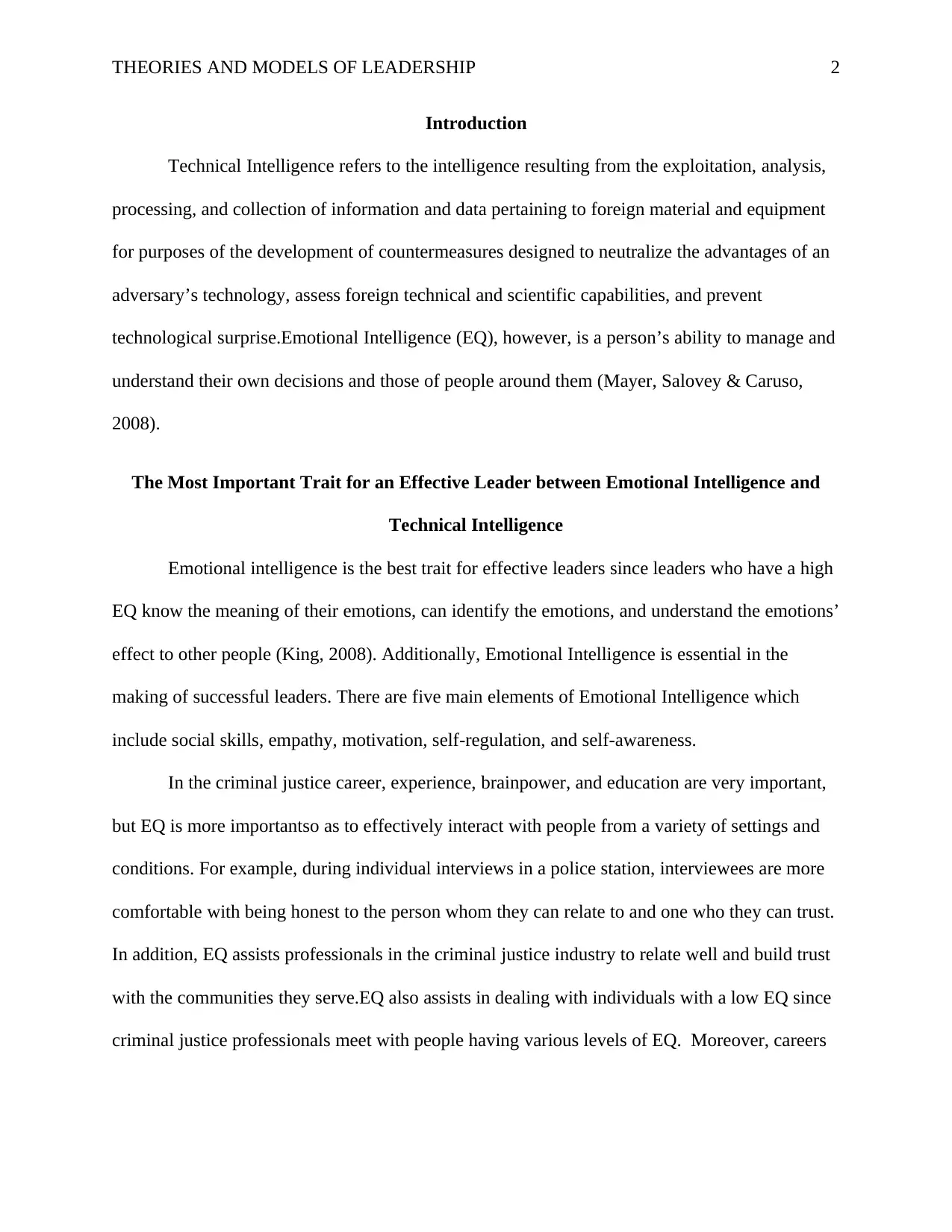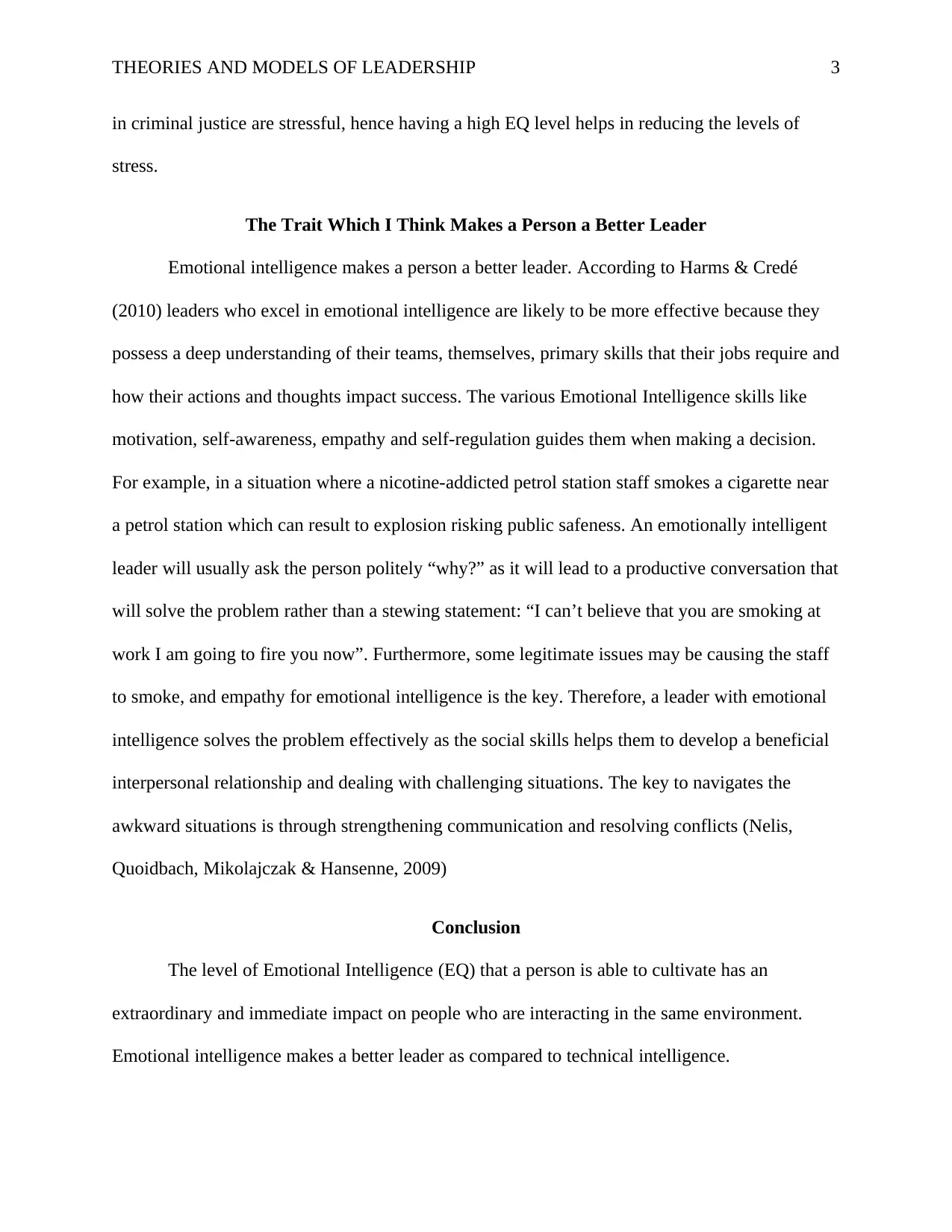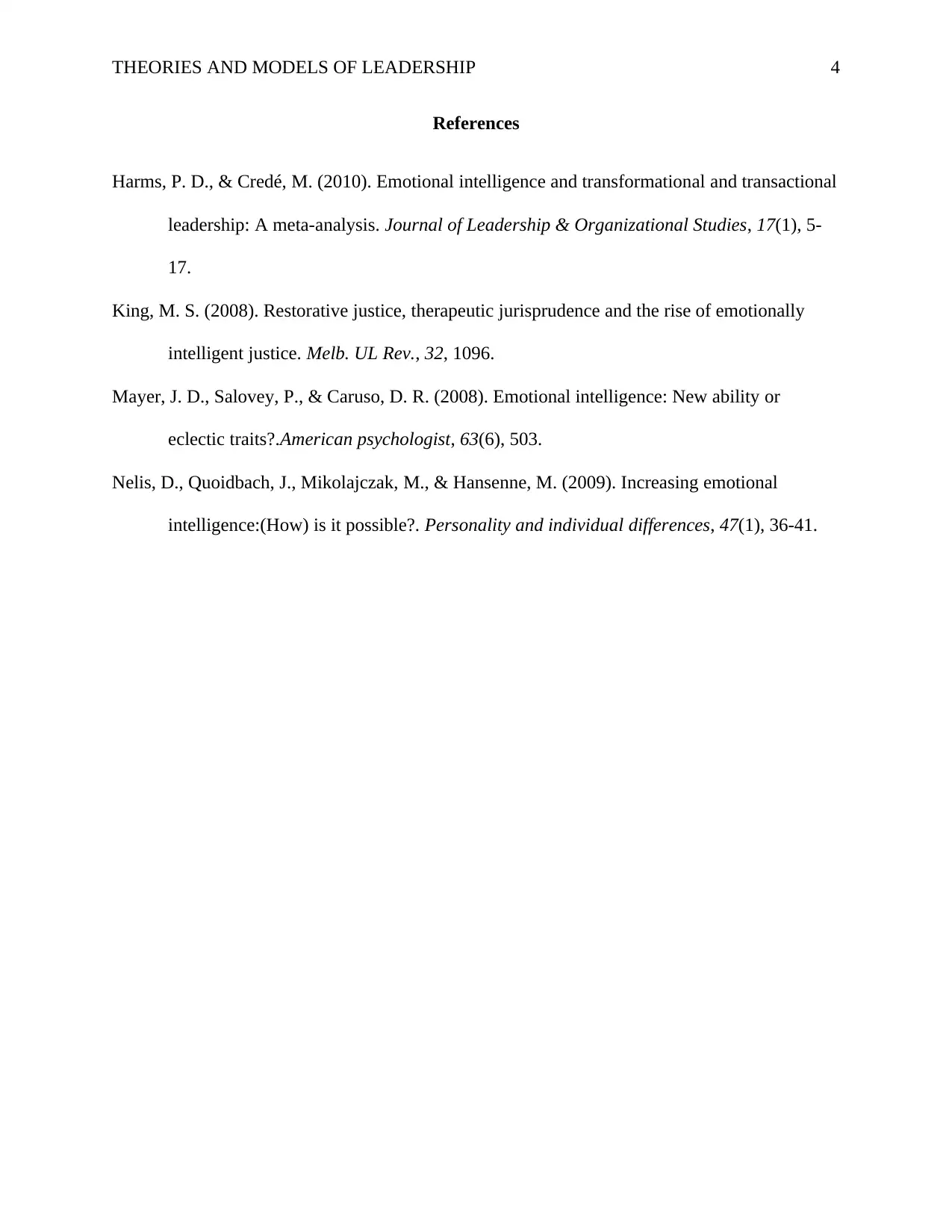Emotional Intelligence: The Key to Effective Leadership Theories
VerifiedAdded on 2023/06/10
|4
|798
|238
Essay
AI Summary
This essay argues that emotional intelligence (EQ) is a more important trait for effective leadership than technical intelligence. It defines technical intelligence and emotional intelligence, highlighting the five main elements of EQ: social skills, empathy, motivation, self-regulation, and self-awareness. The essay provides examples of how EQ assists criminal justice professionals in building trust and dealing with stressful situations. It emphasizes that leaders with high EQ are more effective because they understand their teams, themselves, and how their actions impact success. The essay concludes that cultivating emotional intelligence has a significant and immediate impact on interactions and leadership effectiveness.

Running Head: THEORIES AND MODELS OF LEADERSHIP 1
THEORIES AND MODELS OF LEADERSHIP
Name
Student ID
Institutional Affiliation
THEORIES AND MODELS OF LEADERSHIP
Name
Student ID
Institutional Affiliation
Paraphrase This Document
Need a fresh take? Get an instant paraphrase of this document with our AI Paraphraser

THEORIES AND MODELS OF LEADERSHIP 2
Introduction
Technical Intelligence refers to the intelligence resulting from the exploitation, analysis,
processing, and collection of information and data pertaining to foreign material and equipment
for purposes of the development of countermeasures designed to neutralize the advantages of an
adversary’s technology, assess foreign technical and scientific capabilities, and prevent
technological surprise.Emotional Intelligence (EQ), however, is a person’s ability to manage and
understand their own decisions and those of people around them (Mayer, Salovey & Caruso,
2008).
The Most Important Trait for an Effective Leader between Emotional Intelligence and
Technical Intelligence
Emotional intelligence is the best trait for effective leaders since leaders who have a high
EQ know the meaning of their emotions, can identify the emotions, and understand the emotions’
effect to other people (King, 2008). Additionally, Emotional Intelligence is essential in the
making of successful leaders. There are five main elements of Emotional Intelligence which
include social skills, empathy, motivation, self-regulation, and self-awareness.
In the criminal justice career, experience, brainpower, and education are very important,
but EQ is more importantso as to effectively interact with people from a variety of settings and
conditions. For example, during individual interviews in a police station, interviewees are more
comfortable with being honest to the person whom they can relate to and one who they can trust.
In addition, EQ assists professionals in the criminal justice industry to relate well and build trust
with the communities they serve.EQ also assists in dealing with individuals with a low EQ since
criminal justice professionals meet with people having various levels of EQ. Moreover, careers
Introduction
Technical Intelligence refers to the intelligence resulting from the exploitation, analysis,
processing, and collection of information and data pertaining to foreign material and equipment
for purposes of the development of countermeasures designed to neutralize the advantages of an
adversary’s technology, assess foreign technical and scientific capabilities, and prevent
technological surprise.Emotional Intelligence (EQ), however, is a person’s ability to manage and
understand their own decisions and those of people around them (Mayer, Salovey & Caruso,
2008).
The Most Important Trait for an Effective Leader between Emotional Intelligence and
Technical Intelligence
Emotional intelligence is the best trait for effective leaders since leaders who have a high
EQ know the meaning of their emotions, can identify the emotions, and understand the emotions’
effect to other people (King, 2008). Additionally, Emotional Intelligence is essential in the
making of successful leaders. There are five main elements of Emotional Intelligence which
include social skills, empathy, motivation, self-regulation, and self-awareness.
In the criminal justice career, experience, brainpower, and education are very important,
but EQ is more importantso as to effectively interact with people from a variety of settings and
conditions. For example, during individual interviews in a police station, interviewees are more
comfortable with being honest to the person whom they can relate to and one who they can trust.
In addition, EQ assists professionals in the criminal justice industry to relate well and build trust
with the communities they serve.EQ also assists in dealing with individuals with a low EQ since
criminal justice professionals meet with people having various levels of EQ. Moreover, careers

THEORIES AND MODELS OF LEADERSHIP 3
in criminal justice are stressful, hence having a high EQ level helps in reducing the levels of
stress.
The Trait Which I Think Makes a Person a Better Leader
Emotional intelligence makes a person a better leader. According to Harms & Credé
(2010) leaders who excel in emotional intelligence are likely to be more effective because they
possess a deep understanding of their teams, themselves, primary skills that their jobs require and
how their actions and thoughts impact success. The various Emotional Intelligence skills like
motivation, self-awareness, empathy and self-regulation guides them when making a decision.
For example, in a situation where a nicotine-addicted petrol station staff smokes a cigarette near
a petrol station which can result to explosion risking public safeness. An emotionally intelligent
leader will usually ask the person politely “why?” as it will lead to a productive conversation that
will solve the problem rather than a stewing statement: “I can’t believe that you are smoking at
work I am going to fire you now”. Furthermore, some legitimate issues may be causing the staff
to smoke, and empathy for emotional intelligence is the key. Therefore, a leader with emotional
intelligence solves the problem effectively as the social skills helps them to develop a beneficial
interpersonal relationship and dealing with challenging situations. The key to navigates the
awkward situations is through strengthening communication and resolving conflicts (Nelis,
Quoidbach, Mikolajczak & Hansenne, 2009)
Conclusion
The level of Emotional Intelligence (EQ) that a person is able to cultivate has an
extraordinary and immediate impact on people who are interacting in the same environment.
Emotional intelligence makes a better leader as compared to technical intelligence.
in criminal justice are stressful, hence having a high EQ level helps in reducing the levels of
stress.
The Trait Which I Think Makes a Person a Better Leader
Emotional intelligence makes a person a better leader. According to Harms & Credé
(2010) leaders who excel in emotional intelligence are likely to be more effective because they
possess a deep understanding of their teams, themselves, primary skills that their jobs require and
how their actions and thoughts impact success. The various Emotional Intelligence skills like
motivation, self-awareness, empathy and self-regulation guides them when making a decision.
For example, in a situation where a nicotine-addicted petrol station staff smokes a cigarette near
a petrol station which can result to explosion risking public safeness. An emotionally intelligent
leader will usually ask the person politely “why?” as it will lead to a productive conversation that
will solve the problem rather than a stewing statement: “I can’t believe that you are smoking at
work I am going to fire you now”. Furthermore, some legitimate issues may be causing the staff
to smoke, and empathy for emotional intelligence is the key. Therefore, a leader with emotional
intelligence solves the problem effectively as the social skills helps them to develop a beneficial
interpersonal relationship and dealing with challenging situations. The key to navigates the
awkward situations is through strengthening communication and resolving conflicts (Nelis,
Quoidbach, Mikolajczak & Hansenne, 2009)
Conclusion
The level of Emotional Intelligence (EQ) that a person is able to cultivate has an
extraordinary and immediate impact on people who are interacting in the same environment.
Emotional intelligence makes a better leader as compared to technical intelligence.
⊘ This is a preview!⊘
Do you want full access?
Subscribe today to unlock all pages.

Trusted by 1+ million students worldwide

THEORIES AND MODELS OF LEADERSHIP 4
References
Harms, P. D., & Credé, M. (2010). Emotional intelligence and transformational and transactional
leadership: A meta-analysis. Journal of Leadership & Organizational Studies, 17(1), 5-
17.
King, M. S. (2008). Restorative justice, therapeutic jurisprudence and the rise of emotionally
intelligent justice. Melb. UL Rev., 32, 1096.
Mayer, J. D., Salovey, P., & Caruso, D. R. (2008). Emotional intelligence: New ability or
eclectic traits?.American psychologist, 63(6), 503.
Nelis, D., Quoidbach, J., Mikolajczak, M., & Hansenne, M. (2009). Increasing emotional
intelligence:(How) is it possible?. Personality and individual differences, 47(1), 36-41.
References
Harms, P. D., & Credé, M. (2010). Emotional intelligence and transformational and transactional
leadership: A meta-analysis. Journal of Leadership & Organizational Studies, 17(1), 5-
17.
King, M. S. (2008). Restorative justice, therapeutic jurisprudence and the rise of emotionally
intelligent justice. Melb. UL Rev., 32, 1096.
Mayer, J. D., Salovey, P., & Caruso, D. R. (2008). Emotional intelligence: New ability or
eclectic traits?.American psychologist, 63(6), 503.
Nelis, D., Quoidbach, J., Mikolajczak, M., & Hansenne, M. (2009). Increasing emotional
intelligence:(How) is it possible?. Personality and individual differences, 47(1), 36-41.
1 out of 4
Related Documents
Your All-in-One AI-Powered Toolkit for Academic Success.
+13062052269
info@desklib.com
Available 24*7 on WhatsApp / Email
![[object Object]](/_next/static/media/star-bottom.7253800d.svg)
Unlock your academic potential
Copyright © 2020–2026 A2Z Services. All Rights Reserved. Developed and managed by ZUCOL.





